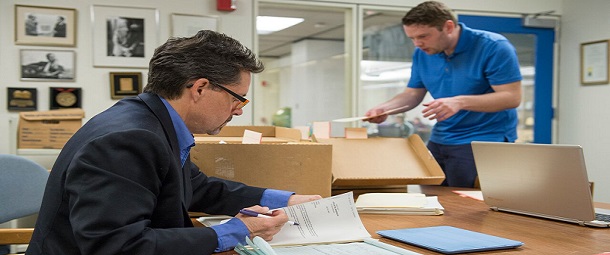Fellowship program offers faculty an opportunity to incorporate Senator Voinovich archives in the classroom
Sen. George Voinovich served as mayor of Cleveland for nine years, governor of Ohio for eight and as a U.S. senator for 12. During that time the Senator acquired an impressive set of documents and materials pertaining to his work on public private partnerships, urban revitalization, health care policy, environmental issues, U.S. foreign relations within the Balkans region, the war in Iraq and more. Upon his retirement in 2011, the Senator donated to two institutions: Ohio University's Mahn Center for Archives & Special Collection at Alden Library and the Western Reserve Historical Society in Cleveland.
Ohio University received all documents pertaining to Voinovich's two terms as governor of Ohio (1990–98) and his two terms in the U.S. Senate (1998–2010). These documents amount to a treasure trove that students don’t often get the chance to explore. However, the Voinovich Collections Fellowship offers faculty the opportunity to bring the Voinovich Collections into the classroom through use of the Voinovich Archival Collections website and associated digitized content.
The Voinovich Collections Fellowship is a competitive stipend program that can accommodate two tenure-track faculty members from any university or college within the state of Ohio. The selected fellows will work with the Ohio University Libraries to choose documents from the physical Voinovich Archival Collections that will be digitized and integrated into the classroom. Fellows receive two stipends of $1,000 plus travel expenses to be covered up to $500.
Sarah Davis, assistant professor at the Voinovich School, was awarded the fellowship for the fall 2015. However, Davis had been interested in the collection long before then.
“When I first started here, in one of my orientation sessions, the collection was introduced as a resource,” Davis said. “It’s kind of a special thing to have the archives from Senator Voinovich’s entire time as a senator and a governor here in our library.”
Initially, Davis did not anticipate working with the collection in her classrooms, as she teaches in environmental studies and specializes in ecosystem ecology. However, Sen. Voinovich pointed out in a meeting that there were records available related to his work on legislation related to carbon emissions.
“I thought it would be interesting to go in the archives and see what kind of role he played,” Davis said.
Davis soon began taking her students to visit the collection, specifically examining how science is used in decision making and how information from scientific communities is used in discussions and debates around proposed legislation, as well as in the formation of that legislation.
“After I got the fellowship, I developed our use of the collection to be a little bit more organized, and I now have the students complete a very targeted research activity,” Davis said. “Students seem to be very engaged when we go to the boxes. They’re very curious about what they’re going to find, and they have very strong reactions to the different things that they find.”
Last year, Davis’s students had the opportunity to meet Sen. Voinovich, adding a human element to their study of the Voinovich Collection.
“I think that the combination of meeting the Senator and working with the collection was really meaningful for the students to help them understand the role of a political leader like that in the process, and then understanding him as a person too,” Davis said. “That had a big impact on the students.”
To date, seven faculty members from three institutions (Ohio University, Cleveland State University and University of Cincinnati) have used the Voinovich Collections in their classrooms. However, another institution will soon be added to that list, as current fellow Robert Baker of Wittenberg University prepares to integrate documents from the collection into his classroom this fall.
Baker teaches courses in urban politics and local government, and he intends to use the Voinovich Collection to provide real-world examples in discussions on downtown development, public-private partnerships, urban revitalization and the relationships between different branches of government.
Currently, Baker is in the process of identifying documents to be digitized for use in his classes. He intends for students to be able to use these documents as primary sources in essays on topics of their own choosing.
“For instance, there are a bunch of documents dealing with devolution and the whole constitutional question of what level of government should do what,” Baker said. “Students will have devolution as an option for a general topic, and take one or more of those documents from the collection as a basis for writing a larger paper.”
Both Baker and Davis praised the opportunities that the fellowship has afforded them.
“Just having the resource there in the library is great,” Davis said. “It’s good to actually apply it, since we’re fortunate enough to have it here on campus.”
Baker seconded Davis’ praise of the collection, and said he hopes the fellowship will continue to reach new audiences.
“I think the more that the Voinovich School can get this program out across the colleges and universities in the state, the better,” Baker said. “I think it’s a wonderful enhancement to the educational process, and I’m just glad that I’m part of it.”
